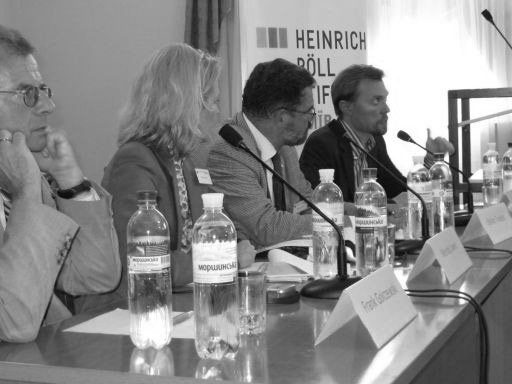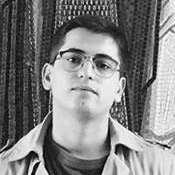[EN] C 23 по 29 сентября в Кишиневе и Одессе пройдет международный форум «Приднестровье — забытый Холокост, 1941–1944» в рамках проекта Geschichtswerkstatt Europa
Transnistria—The Forgotten Holocaust, 1941 To 1944. International Forum 2012 of Geschichtswerkstatt Europa, in Chişinău, Republic of Moldova, and Odessa, Ukraine, 23 to 29 September 2012.
 1 815
1 815 
© Geschichtswerkstatt Europa
Transnistria, the region between rivers Dniester (Nistru) and Bug is still a white spot on the map of the Holocaust. Today mostly part of Ukraine with a small strip belonging to Moldova’s separatist eastern edge, the self-proclaimed ‘Dniester Moldovan Republic’, it was from the summer of 1941 to the spring of 1944 under Romanian civilian administration. In the Treaty of Tighina of 30 August 1941, the German Reich had handed over this formerly Soviet territory to its Romanian ally while still maintaining a military presence there. Between September 1941 and October 1942, some 100,000 Jews from Romania including the regained provinces of Northern Bukovina and Bessarabia were deported beyond river Dniester. In the regional capital Odessa and in concentration camps like Bogdanovka, Domanovka, Akmetchetca or Vapnyarka mass shootings of Jews took place, while others were put to death by hunger or diseases. An estimated number of up to 300,000 Romanian and Ukrainian Jews fell victim to the Holocaust in Transnistria. Perpetrators were Romanian officials, military personnel and civilians as well as German military units and administrative staff, also members of the regional German community, i.e., Schwarzmeerdeutsche. Probably only 100,000 survived. There is, however, also an additional dimension to the Holocaust in Transnistria: In the summer and fall of 1942, also some 25.000 Romanian Roma were deported to the region. Here approximately 11.000 died of cold, hunger or illness and some were shot, while the others could return to Romania in 1944.
The International Forum of GESCHICHTSWERKSTATT EUROPA is an annual one-week event focusing on World War II in Eastern Europe. Previous forums took place in Kyiv, Vilnius, Wrocław and Leipzig. The German Federal Foundation “Remembrance, Responsibility and Future” provides 25 fellowships for participating students and PhD candidates, and additional participants are welcome. The forum is chaired by Stefan Troebst, professor of East European Cultural Studies at the University of Leipzig, and coordinated by Ulrike Breitsprecher, research associate at the Global and European Studies Institute of the same university.
In the focus of this year’s International Forum is the place of the Holocaust and the ordeal of Roma in Transnistria in the contemporary cultures of remembrance of Romania, Ukraine, Israel, Moldova (including this country’s separatist eastern rim). Venue is the Moldovan State University in Chişinău, and there will be field trips and excursions to Odessa and Bogdanovka. In Chişinău, a public lecture on the Holocaust and the Porajmos in Transnistria as well as a public roundtable on the two mass crimes in contemporary Moldovan, Romanian and Ukrainian cultures of remembrance will be organized. The students and PhD candidates from Moldova, Romania, Ukraine, other countries of the region as well as from Israel and Germany will be offered both topical seminars on the Holocaust and the Porajmos in the region and methodological seminars on topics like oral history, life-story interviews or museology. Participants of the International Forum are 25 fellows from Eastern and East-Central Europe as well as historians and social scientists from Moldova, Ukraine, Romania, Israel, the US and Germany — Viorel Achim (Bucharest), Svetlana Burmistr (Berlin) (tbc), Igor Caşu (Chişinău) (tbc), Ronit Fisher (Haifa) (tbc), Mariana Hausleitner (Berlin), Guido Hausmann (Cologne), Radu Ioanid (Washington, DC) (tbc), Brigitte Mihók (Berlin), Vasilyi Shchetnikov (Odessa) (tbc), Felicia Waldman (Bucharest) and Jan Zofka (Leipzig).
Main partner of the forum is the Faculty of History of the Moldovan State University, represented by its dean Professor Igor Şarov and by Professor Valeriu Moşneaga, a former member of the Advisory Council of the International Forum. Cooperation partners are the German Academic Exchange Service (DAAD), represented in Chişinău by Sophia Bellmann at the National Pedagogical University “Ion Creangă”, and the Jewish NGO “Migdal” in Odessa. Organizational support is provided by AQA Logistics Chişinău and the Moldova Institut Leipzig.
Contact:
Professor Stefan Troebst
Global and European Studies Institute
University of Leipzig
[email protected]
Ulrike Breitsprecher
Global and European Studies Institute
University of Leipzig
[email protected]




Комментарии